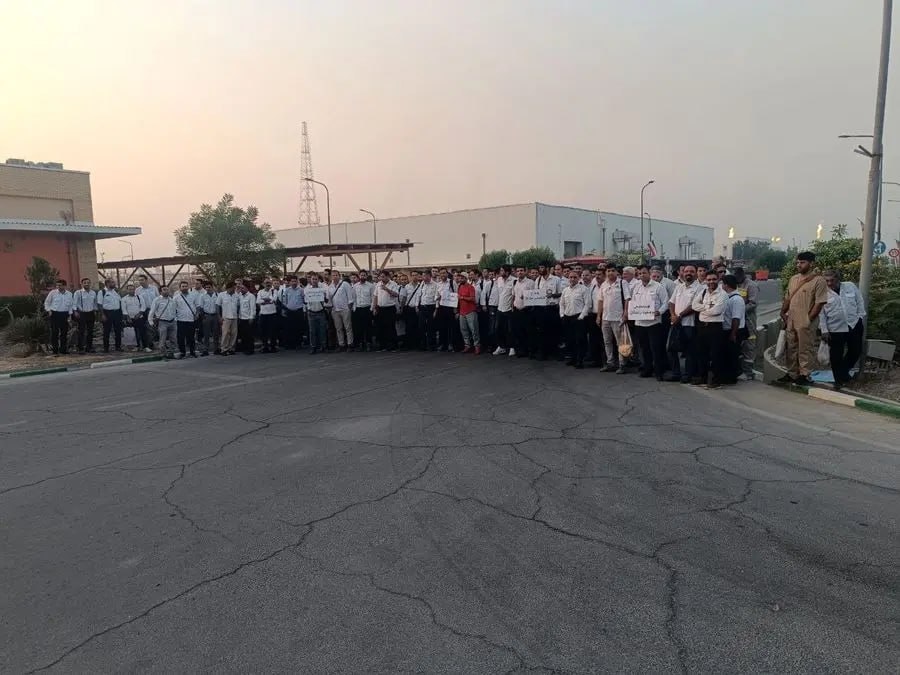Contract Workers of South Pars Gas Company Continue Protests Over Wages and Working Conditions
Tehran, Iran – Contract workers from the South Pars Gas Company have entered the 14th week of protests, rallying to demand better wages, improved working conditions, and a response from authorities regarding their grievances. The protests, which began in mid-August, have gained momentum as workers express frustration over stagnant wages that have failed to keep pace with rising inflation and the deteriorating conditions of their work environments.
Background of the Protests
The South Pars Gas Company, a major player in Iran’s energy sector and part of the South Pars gas field—the world’s largest natural gas field—has seen its contract workers increasingly vocalize their demands for fair treatment. The protests have taken place across various facilities and sites, with workers staging rallies to draw attention to their plight and pressuring the government to act.
Workers allege that their pay has not only been inadequate but also inconsistent, with many reporting delayed salary payments that exacerbate their financial difficulties. With inflation soaring in Iran, the situation has become increasingly untenable for many families dependent on these wages.
Key Issues Raised by Workers
The protesters have outlined several key demands that they want the government and company management to address:
- Wage Increases: Workers are calling for a wage increase that reflects the current economic conditions and compensates for the increased cost of living in Iran. Many have pointed out that their salaries have remained unchanged for years, while prices for basic goods continue to rise.
- Improved Working Conditions: Reports from workers highlight unsafe and inadequate working conditions in various gas production and processing facilities. Workers have raised concerns about insufficient safety measures, lack of proper equipment, and general neglect of health protocols.
- Job Security: Many contract workers face uncertainty regarding their employment status, with frequent job turnover and a lack of long-term contracts contributing to anxiety about their futures.
- Government Accountability: Protesters have expressed frustration over the lack of response from authorities. They are demanding accountability from the government and management for failing to address their concerns and provide meaningful dialogue.
Government and Company Response
Despite the prolonged protests, the Iranian government has been largely silent on the issues raised by the workers. Some officials have made vague promises regarding wage reviews, but workers have stated that concrete actions are needed rather than empty assurances.
The South Pars Gas Company, while acknowledging the protests, has not provided substantial information on plans to address the workers’ grievances. This lack of communication has fueled further dissatisfaction and has led to increased solidarity among workers as they continue to rally for their rights.
Community Support and Solidarity
The protests have garnered support from various labor organizations and civil society groups within Iran. Activists have highlighted the struggles of the South Pars workers as emblematic of broader issues facing labor rights in the country. Solidarity rallies have been organized in other cities, and social media platforms have played a crucial role in amplifying the workers’ voices and concerns.
Some labor advocates have called for a broader movement to address the systemic issues within Iran’s labor market, emphasizing the need for fair treatment of all workers, especially those in critical sectors such as oil and gas. The situation has become a focal point for discussions about labor rights and economic justice in Iran.
International Reactions
International human rights organizations have expressed concern regarding the treatment of workers in Iran, particularly in the energy sector. They have called on the Iranian government to uphold labor rights and ensure that workers are treated fairly and with dignity. These organizations are monitoring the situation closely, urging both the government and the South Pars Gas Company to engage with workers in good faith.
Looking Ahead
As the protests continue, it remains to be seen how the Iranian government and the South Pars Gas Company will respond to the workers’ demands. The growing unrest reflects a broader discontent with economic conditions in Iran, which has been exacerbated by international sanctions and domestic policies.
Workers have vowed to maintain their protests until their demands are met, indicating a readiness to escalate their actions if necessary. The situation highlights the urgent need for dialogue between workers, management, and government officials to address the underlying issues and restore stability in the workforce.
As the protests enter their 14th week, the resilience of the workers in the face of adversity serves as a reminder of the ongoing struggles for labor rights in Iran. The coming days will be critical in determining whether meaningful change can be achieved or if the protests will continue to escalate. The workers’ determination to advocate for their rights underscores the importance of fair labor practices and the necessity of government accountability in addressing the needs of its citizens.
